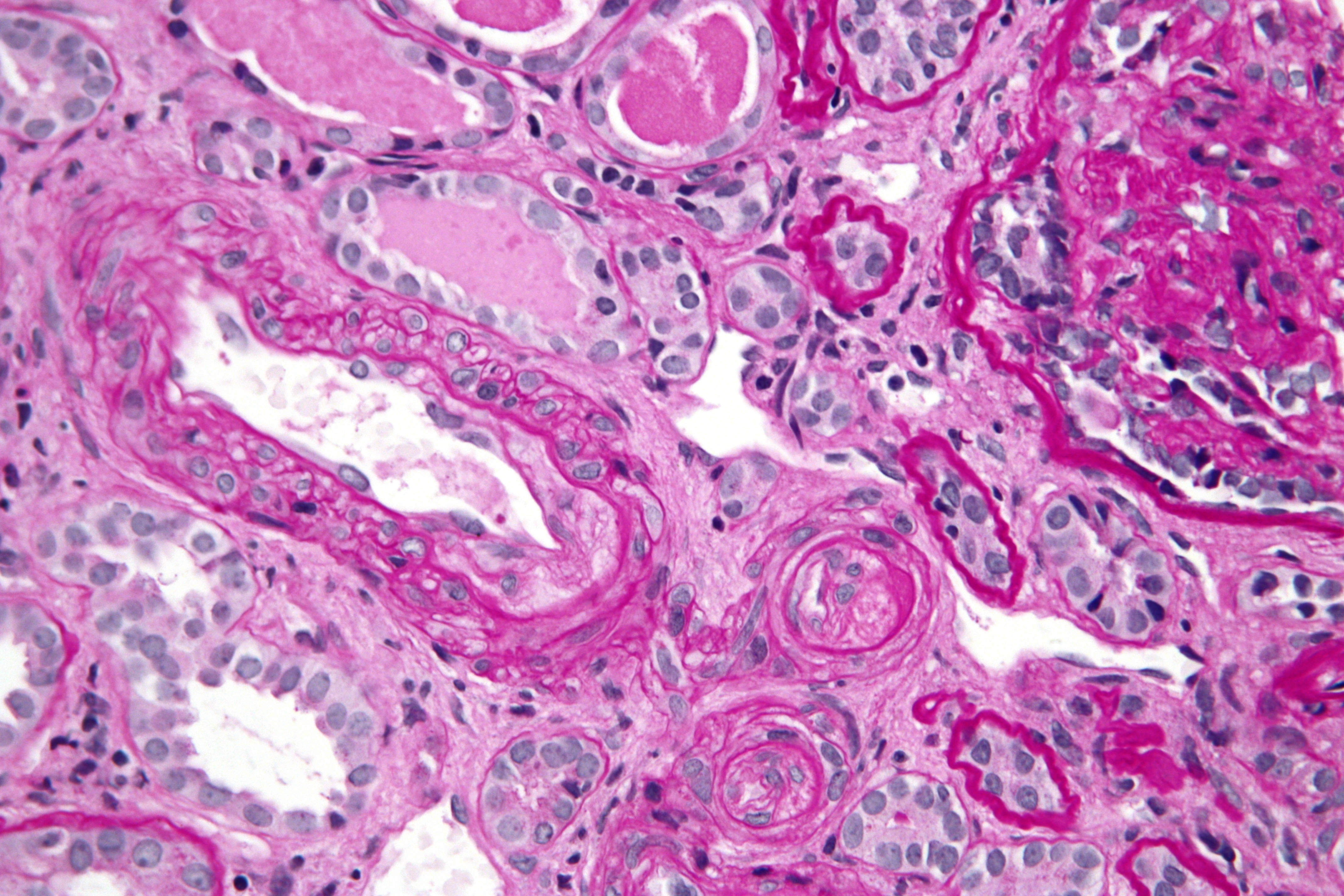
Antiphospholipid syndrome
Antiphospholipid syndrome, or antiphospholipid antibody syndrome (APS or APLS), is an autoimmune, hypercoagulable state caused by antiphospholipid antibodies. APS can lead to blood clots (thrombosis) in both arteries and veins, pregnancy-related complications, and other symptoms like low platelets, kidney disease, heart disease, and rash. Although the exact etiology of APS is still not clear, genetics is believed to play a key role in the development of the disease.[3] Diagnosis is made based on symptoms and testing, but sometimes research criteria are used to aid in diagnosis. The research criteria for definite APS requires one clinical event (i.e. thrombosis or pregnancy complication) and two positive blood test results spaced at least three months apart that detect lupus anticoagulant, anti-apolipoprotein antibodies, and/or anti-cardiolipin antibodies.[4]
Antiphospholipid syndrome
Antiphospholipid syndrome can be primary or secondary. Primary antiphospholipid syndrome occurs in the absence of any other related disease. Secondary antiphospholipid syndrome occurs with other autoimmune diseases, such as systemic lupus erythematosus. In rare cases, APS leads to rapid organ failure due to generalised thrombosis; this is termed "catastrophic antiphospholipid syndrome" (CAPS or Asherson syndrome) and is associated with a high risk of death.
Antiphospholipid syndrome often requires treatment with anticoagulant medication to reduce the risk of further episodes of thrombosis and improve the prognosis of pregnancy. The anticoagulant medication used for treatment may differ depending on the circumstance, such as pregnancy.
Mechanisms[edit]
Antiphospholipid syndrome is an autoimmune disease, in which "antiphospholipid antibodies" react against proteins that bind to anionic phospholipids on plasma membranes. Anticardiolipin antibodies, β2glycoprotein 1, and lupus anticoagulant are antiphospholipid antibodies that are thought to clinically cause disease. These antibodies lead to blood clots and vascular disease in the presence (secondary APS) or absence (primary APS) of other diseases.[18] While the exact functions of the antibodies are not known, the activation of the coagulation system is evident.
Anti-ApoH and a subset of anti-cardiolipin antibodies bind to ApoH. ApoH inhibits protein C, a glycoprotein with important regulatory function of coagulation (inactivates Factor Va and Factor VIIIa). Lupus anticoagulant antibodies bind to prothrombin, thus increasing its cleavage to thrombin, its active form.
Other antibodies associated with APS include antibodies against protein S and annexin A5. Protein S is a co-factor of protein C, which is one of the body's own anti-clotting factors. Annexin A5 forms a shield around negatively charged phospholipid molecules, which reduces the membrane's ability to participate in clotting. Thus, antibodies against protein S and anti-annexin A5 decrease protein C efficiency and increase phospholipid-dependent coagulation steps respectively, which leads to increased clotting potential.[19][20]
The lupus anticoagulant antibodies are those that show the closest association with thrombosis; those that target β2glycoprotein 1 have a greater association with thrombosis than those that target prothrombin.
Anticardiolipin antibodies are associated with thrombosis at moderate to high titres (over 40 GPLU or MPLU).
Patients with both lupus anticoagulant antibodies and moderate or high titre anticardiolipin antibodies show a greater risk of thrombosis than with one alone.
The increased risks of recurrent miscarriage, intrauterine growth restriction and preterm birth by antiphospholipid antibodies, as supported by in vitro studies, include decreased trophoblast viability, syncytialization and invasion, deranged production of hormones and signalling molecules by trophoblasts, as well as activation of coagulation and complement pathways.[9]
Treatment[edit]
Treatment depends on a person's APS symptoms.[25] Typically a medication that decreases the body's ability to form blood clots is given to prevent future clots. Low dose aspirin can be given to people who have APS antibodies but no symptoms, high risk individuals with lupus erythematosus and APS antibodies but no symptoms of APS, and non-pregnant people who had APS during pregnancy.[25][26] For those people with APS who have had a blood clot (venous or arterial), anticoagulants such as warfarin are used to prevent future clots.[25][26] If warfarin is used, the INR is kept between 2.0 and 3.0.[26] Direct-acting oral anticoagulants may be used as an alternative to warfarin, but not in people with APS who had a previous arterial blood clot[27][28] or are "triple positive" with all types of antiphospholipid antibody (lupus anticoagulant, anticardiolipin antibody and anti-β2 glycoprotein I antibody).[25][26][29][30] In people with arterial blood clot related APS, using direct-acting oral anticoagulants has shown to increase the risk of future arterial blood clots and should not be used.[27][28]
In pregnant people with only pregnancy related APS or only past blood clot related APS, low molecular weight heparin and low-dose aspirin are used instead of warfarin because of warfarin's ability to cause birth defects.[25][26] Heparin and aspirin together appears to make miscarriage less likely in pregnant women with APS.[26] Women with recurrent miscarriages are often advised to take aspirin and to start low molecular weight heparin treatment after missing a menstrual cycle.[citation needed] In refractory cases plasmapheresis may be used.[citation needed]
Factors that increase likelihood of developing APS related future blood clots and pregnancy complications include:
Also, a history of previous blood clots in someone with APS increases the risk for certain pregnancy complications, such as death of the child, smaller sized baby, and blood clots during and after pregnancy.[31] Outside of people with APS having an increase risk of blood clots and pregnancy complications, people with APS generally have increase risk of atherosclerotic disease.[6][32]
Other risk stratification criteria for predicting blood clots and pregnancy complications have been proposed, such as the aPL Score and the Global APS score, but further data is needed to validate these tools.[5]
Factors associated with developing antiphospholipid syndrome include:
History[edit]
Antiphospholipid syndrome was described in full in the 1980s, by E. Nigel Harris and Aziz Gharavi. They published the first papers in 1983.[35][36] The syndrome was referred to as "Hughes syndrome" among colleagues after the rheumatologist Graham R.V. Hughes (St. Thomas' Hospital, London, UK), who brought together the team.
According to a 2006 Sydney consensus statement,[10] it is advisable to classify APS into one of the following categories for research purposes: